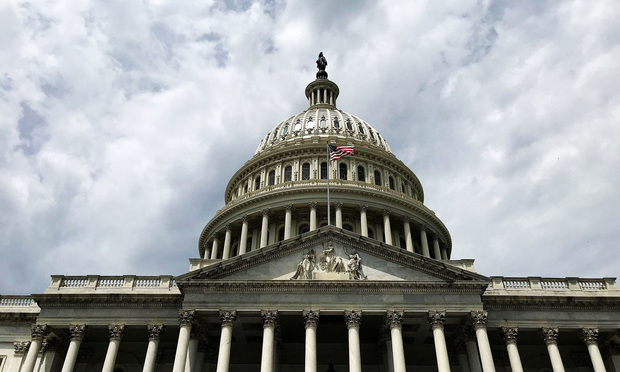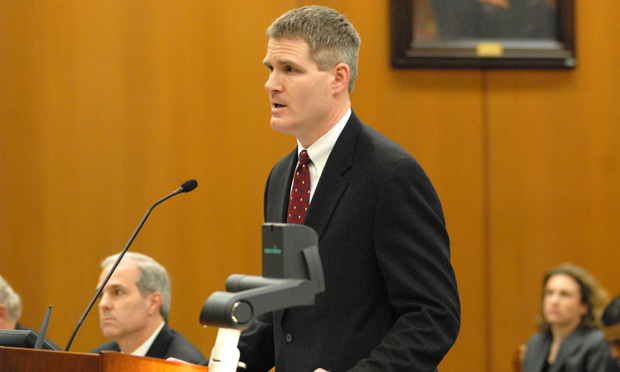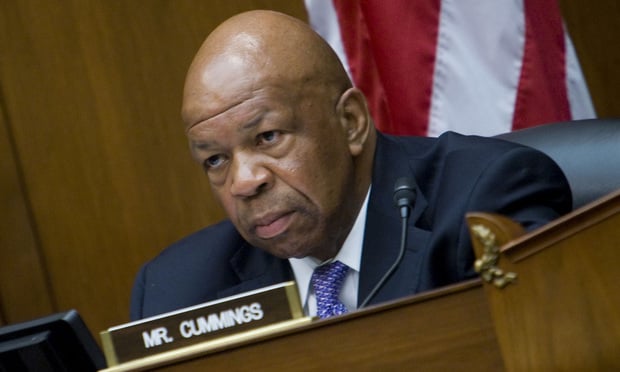DOJ Lawyer Stands Up Dems—and Puts Obscure House Rule in Spotlight
The Justice Department's targeting of what was once an obscure House rule reflects the ratcheting-up of resistance, former U.S. House lawyers said.
April 25, 2019 at 05:35 PM
8 minute read
 U.S. Capitol building in Washington, D.C. June 13, 2018. Photo: Diego M. Radzinschi/ALM
U.S. Capitol building in Washington, D.C. June 13, 2018. Photo: Diego M. Radzinschi/ALM
Shortly before 9 a.m. Thursday, Steve Castor strolled up to a House Oversight and Reform Committee office and greeted the reporters and photographers staking out a deposition that was not to be.
“Nobody's coming today,” said Castor, a top Republican lawyer on the committee. Within a half hour, he left. The absence of Justice Department attorney John Gore was noted—and not at all surprising.
Committee investigators had hoped to question Gore, a top official in the Justice Department's civil rights division, about the Trump administration's push to add a citizenship question to the 2020 census. But on the eve of the deposition, the Justice Department's top congressional liaison told the committee that U.S. Attorney General William Barr had directed Gore not to appear, deepening the Trump administration's defiance of House subpoenas and other demands for information that President Donald Trump has decried as partisan.
With that letter, the Justice Department also highlighted an arcane House rule that has been featured prominently in the Trump administration's clash with Congress: the prohibition on administration lawyers sitting in on depositions of government officials.
That rule, in place for the past decade under Democratic and Republican majorities alike, allows government officials to have personal counsel accompany them in depositions but broadly shuts agency lawyers out of the room. It was left untouched as House Democrats, regaining the gavel in January, changed other deposition rules in preparation for an aggressive stretch of investigations.
In interviews, former House lawyers said the rule is intended to put government officials at ease during depositions, freeing them from fears that a lawyer from their agency will report back about their testimony. Also, they said, the rule removes from the deposition room a government minder who might disrupt the questioning of an agency official.
“We don't want the agency or department there looking over their shoulder, perhaps in some way chilling the honesty or the openness of the witness,” said King & Spalding partner Thomas J. Spulak, who served as House general counsel in the mid-1990s. “It makes sense, and that's the way it should be.”
Within the past week, the Trump administration has taken a different view.
In his letter to the House Oversight and Reform Committee on Wednesday, Assistant Attorney General Stephen Boyd objected to the House's refusal to allow a Justice Department attorney to attend Gore's deposition, writing that the “exclusion of agency counsel from a compelled deposition would unconstitutionally infringe upon the prerogatives of the executive branch.”
“We are disappointed that the committee remains unwilling to permit department counsel to represent the interests of the executive branch in the deposition of a senior department official,” wrote Boyd, the head of the Justice Department's office of legislative affairs.
In the aftermath of the release of Special Counsel Robert Mueller III's report—a 448-page document detailing the Russia investigation that drew from the notes and testimony of Trump aides to paint an unflattering picture of the White House—the president has taken an increasingly pugnacious tone toward House Democrats. On Wednesday, Trump proclaimed that his administration would be “fighting all the subpoenas” because he considered them politically motivated.
The Justice Department's targeting of what was once an obscure House rule reflects the ratcheting-up of that resistance, former House lawyers said.
 Thomas G. Hungar argues at the COA. Nov. 17, 2009. Aaron C. Hayes/Daily Report.
Thomas G. Hungar argues at the COA. Nov. 17, 2009. Aaron C. Hayes/Daily Report.“I think it's just indicative of the difficult state of relations between the House and the White House in this environment. They are fighting over things that, in the past, were probably more likely to be resolved through mutual accommodation and negotiation,” said Gibson, Dunn & Crutcher partner Thomas Hungar, who stepped down as House general counsel in January after nearly three years in the role.
In recent years, under a Republican majority, officials have sat for depositions without counsel from their agencies in the room, said Sam Dewey, a former senior counsel on the House Financial Services Committee who previously served as chief investigator for the Senate's special committee on aging.
“What you would do is you would have the agency counsel literally sitting in the conference room next door, and if they needed to consult, they'd go consult. Or you'd take a break every hour and they'd go consult,” said Dewey, now counsel at McDermott Will & Emery.
Boyd's letter Wednesday drew a rebuke from the House Oversight and Reform Committee's chairman, U.S. Rep. Elijah Cummings, who noted Trump's recent statement that he was opposed to current and former White House officials testifying before Congress. In refusing to allow Gore to be deposed, Cummings said, “the Trump administration went even further by expanding this policy to employees at federal agencies.”
Gore was not the first administration official to stand up the House Oversight Committee this week.
On Tuesday, the former White House personnel security director, Carl Kline, skipped a deposition scheduled as part of the committee's probe into whether the Trump administration mishandled the security clearance process for top officials.
In advance of the deposition, Kline's personal attorney, McGlinchey Stafford partner Robert Driscoll, relayed the administration's view that he should not sit for questioning unless a White House lawyer was allowed to attend. White House counsel Pat Cipollone had previously informed the committee that Kline would not appear unless a lawyer from the White House counsel's office was allowed “to appear with Mr. Kline in order to preserve and protect executive branch confidentiality interests.”
The scheduling of the Gore and Kline depositions marked an escalation of tensions between the House and Trump administration. Under calmer conditions, the House committee questions government officials not in a deposition but rather in a so-called transcribed interview, a format that allows agency lawyers to attend.
“Often, the fact is that if it's an executive branch official, they will end up appearing voluntarily rather than through a subpoena. And with a transcribed interview, the rules are more lax and flexible,” Hungar said.
 U.S. Representative Elijah Cummings (D-MD), during a Committee on Oversight & Government Reform hearing in 2011. Photo: Diego M. Radzinschi/The National Law Journal
U.S. Representative Elijah Cummings (D-MD), during a Committee on Oversight & Government Reform hearing in 2011. Photo: Diego M. Radzinschi/The National Law JournalThe House Oversight Committee held such an interview with Gore in March. In a letter to Barr earlier this month, Cummings said Gore “refused to answer more than 150 questions at the direction of department counsel.”
“After the interview,” Cummings added, “as an accommodation, committee staff identified 18 key questions that Mr. Gore had refused to answer and invited him to return voluntarily to address that narrow set of questions. The department refused to make him available, which made the subpoena necessary.”
Gore's personal lawyer, McGuireWoods partner John D. Adams, wrote in a letter to the committee Wednesday that Gore had answered more than 500 questions during the March 7 interview. The impasse between the committee and the Justice Department, Adams said, put Gore in an “intractable bind.”
“He is happy to continue to cooperate with appropriate requests from the committee, as he has on multiple occasions in this matter,” Adams wrote. “But he is not willing to ignore the attorney general of the United States.”
The House Oversight Committee moved Tuesday to hold Kline in contempt and could take a similar step with Gore, a step that could set the stage for the deposition dispute to reach a federal court.
“As an officer of the court and a senior lawyer in a position of public trust at the Department of Justice, Mr. Gore should be well aware of his constitutional, legal and ethical obligations to comply with a duly authorized subpoena from Congress,” Cummings said Wednesday. “Those obligations have not been erased by the attorney general or the president.”
Read more:
US House Democrats Just Made It Easier for Investigators to Depose Witnesses
'I Don't Want My Client to Be Blindsided': Lawyers Brace for Rep. Porter's Questions
Thomas Hungar, Formerly House General Counsel, Returns to Gibson Dunn
This content has been archived. It is available through our partners, LexisNexis® and Bloomberg Law.
To view this content, please continue to their sites.
Not a Lexis Subscriber?
Subscribe Now
Not a Bloomberg Law Subscriber?
Subscribe Now
NOT FOR REPRINT
© 2025 ALM Global, LLC, All Rights Reserved. Request academic re-use from www.copyright.com. All other uses, submit a request to [email protected]. For more information visit Asset & Logo Licensing.
You Might Like
View All
Trump Administration Faces Legal Challenge Over EO Impacting Federal Workers
3 minute read
US Judge Cannon Blocks DOJ From Releasing Final Report in Trump Documents Probe
3 minute read
Private Equity Giant KKR Refiles SDNY Countersuit in DOJ Premerger Filing Row
3 minute readTrending Stories
Who Got The Work
J. Brugh Lower of Gibbons has entered an appearance for industrial equipment supplier Devco Corporation in a pending trademark infringement lawsuit. The suit, accusing the defendant of selling knock-off Graco products, was filed Dec. 18 in New Jersey District Court by Rivkin Radler on behalf of Graco Inc. and Graco Minnesota. The case, assigned to U.S. District Judge Zahid N. Quraishi, is 3:24-cv-11294, Graco Inc. et al v. Devco Corporation.
Who Got The Work
Rebecca Maller-Stein and Kent A. Yalowitz of Arnold & Porter Kaye Scholer have entered their appearances for Hanaco Venture Capital and its executives, Lior Prosor and David Frankel, in a pending securities lawsuit. The action, filed on Dec. 24 in New York Southern District Court by Zell, Aron & Co. on behalf of Goldeneye Advisors, accuses the defendants of negligently and fraudulently managing the plaintiff's $1 million investment. The case, assigned to U.S. District Judge Vernon S. Broderick, is 1:24-cv-09918, Goldeneye Advisors, LLC v. Hanaco Venture Capital, Ltd. et al.
Who Got The Work
Attorneys from A&O Shearman has stepped in as defense counsel for Toronto-Dominion Bank and other defendants in a pending securities class action. The suit, filed Dec. 11 in New York Southern District Court by Bleichmar Fonti & Auld, accuses the defendants of concealing the bank's 'pervasive' deficiencies in regards to its compliance with the Bank Secrecy Act and the quality of its anti-money laundering controls. The case, assigned to U.S. District Judge Arun Subramanian, is 1:24-cv-09445, Gonzalez v. The Toronto-Dominion Bank et al.
Who Got The Work
Crown Castle International, a Pennsylvania company providing shared communications infrastructure, has turned to Luke D. Wolf of Gordon Rees Scully Mansukhani to fend off a pending breach-of-contract lawsuit. The court action, filed Nov. 25 in Michigan Eastern District Court by Hooper Hathaway PC on behalf of The Town Residences LLC, accuses Crown Castle of failing to transfer approximately $30,000 in utility payments from T-Mobile in breach of a roof-top lease and assignment agreement. The case, assigned to U.S. District Judge Susan K. Declercq, is 2:24-cv-13131, The Town Residences LLC v. T-Mobile US, Inc. et al.
Who Got The Work
Wilfred P. Coronato and Daniel M. Schwartz of McCarter & English have stepped in as defense counsel to Electrolux Home Products Inc. in a pending product liability lawsuit. The court action, filed Nov. 26 in New York Eastern District Court by Poulos Lopiccolo PC and Nagel Rice LLP on behalf of David Stern, alleges that the defendant's refrigerators’ drawers and shelving repeatedly break and fall apart within months after purchase. The case, assigned to U.S. District Judge Joan M. Azrack, is 2:24-cv-08204, Stern v. Electrolux Home Products, Inc.
Featured Firms
Law Offices of Gary Martin Hays & Associates, P.C.
(470) 294-1674
Law Offices of Mark E. Salomone
(857) 444-6468
Smith & Hassler
(713) 739-1250











